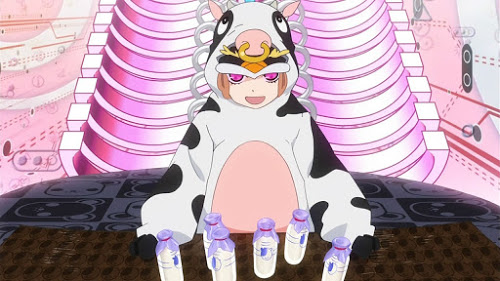Sorry for the delay, I procrastinated a little too long and ended up with not enough time to get through Ikuhara’s second anime: Mawaru Penguindrum.
Unpacking any Ikuhara show is really difficult. Upon rewatches and re-rewatches, you’ll still be finding new things from these shows (being Revolutionary Girl Utena, Penguindrum, and Yuri Kuma Arashi). On one watching, I have a faint grasp on what Penguindrum was all about, which is about where I expected to be.
The show runs 15 episodes shorter than Utena, but feels just as packed. It opens immediately with the same kind of metaphor and visual style that Ikuhara brought with Utena, but it’s much more reminiscent of Yuri Kuma Arashi than Utena in color palate. With Penguindrum, Ikuhara does continue the motif of repeating the same sequences (this time the “Rock and Roll Night” song sequence and Ringo’s repeated usage of “destiny” and “fate”) in an effort to beat you over the head with metaphor.
The theme that seems to drive the whole show is destiny or fate (Sentai translates “unmei” as both destiny and fate seemingly interchangeably, but what do I know, I don’t speak Japanese). Everyone has a predetermined destiny, but you can change it if you’re willing to fight against it. Because, just like words in a journal, it can be erased and rewritten. Entire events can be changed with the stroke of a pencil.
The story going on is of a set of siblings—Shoma, Kanba, and Himari—as they deal with a myriad of their own life issues. Their parents were terrorists who caused the death of dozens, if not hundreds. It killed Momoka and affected her sister Ringo and best friends Tabuki and Yuri. And what does this one person’s death affect everyone around her. Ringo wants to become her, Yuri and Tabuki love and were changed irrevocably by her, and the three siblings are caught in between because their parents were the ones who killed her.
But it’s the siblings that change the lives of Ringo, Tabuki, and Yuri. Shoma and Himari give Ringo her own life and her own confirmation of existence after years of feeling like she’s defined as the reincarnation of Momoka. Tabuki tries to enact vengeance on the children, but realize that the sins of their parents are not those of the children after almost killing an innocent kid in Himari. Yuri can start accepting that Momoka is gone with Tabuki’s own growth and they help each other move toward that end mutually.
What connects everything is family. Revealed late in the show, Shoma, Kanba, and Himari aren’t actually siblings but they might as well be. They’re three close friends who’ve been adopted into Shoma’s family filled with love and terrorists. And about how far anyone will go for their family, between Tabuki almost killing someone, Ringo stalking Tabuki, Kanba becoming a terrorist himself, and Shoma just being him.
This show is filled with more than 500 odd words would cover, as every Ikuhara product is. I’ve only not watched this because I just didn’t feel like it. I never got around to it for this or that reason, but I’m glad I finally did. Penguindrum joins the annuls of great shows of its decade in my mind.
